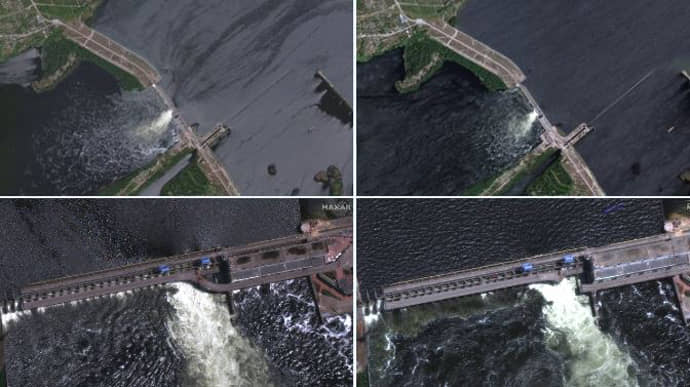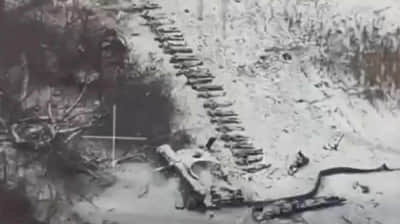Western journalists speculate that it might not have been explosion that destroyed dam at hydroelectric power plant

Based on satellite images taken before the dam at the Kakhovka Hydroelectric Power Plant (HPP) burst, journalists from leading international media outlets have come to the conclusion that the dam may have collapsed due to previously sustained damage rather than as a result of the explosion.
Source: Christopher Miller of The Financial Times; Evan Hill of The Washington Post; Oliver Carroll of The Economist
Details: Miller pointed out that satellite images made by Maxar in recent weeks showed recent damage to the Nova Kakhovka dam’s sluice gates and a section of roadway running across it.
Satellite images made by @Maxar on June 5 showed recent damage to the Nova Khakova dam’s sluice gates and a section of roadway running across it. Before images (1 and 3) made on May 28. After images (2 and 4) made June 5, around 12:15pm. pic.twitter.com/Qi7dY6M2yM
— Christopher Miller (@ChristopherJM) June 6, 2023
Hill pointed out that shortly before the dam burst, the water level in the Kakhovka Reservoir had reached unprecedented levels. The New York Times said this could have happened because Russia, which controlled the hydroelectric power plant, kept too few floodgates open.
Prior to whatever happened overnight, the Kakhovka Reservoir had reached unprecedentedly high levels. This was likely due to Russian forces keeping too few gates open, the NYT reported, just months after letting the reservoir sink to historic lows: https://t.co/g9sGjPNTt9 pic.twitter.com/mKuGFakb3M
— Evan Hill (@evanhill) June 6, 2023
At the same time, Economist journalist Oliver Carroll reported that eyewitnesses had told the newspaper about a "deafening explosion" that was heard in the early morning in Kakhovka.
Eyewitnesses told us that there was a deafening explosion from #Kakhovka in the early morning, with sky turned to white and windows breaking as far as 80 km away.
— Oliver Carroll (@olliecarroll) June 6, 2023
Read also: Flooded South: the consequences of blowing up the Kakhovka dam (in brief)
Background:
- On the night of 6 June, the Russian occupiers blew up the Kakhovka Hydroelectric Power Plant, destroying the turbine hall and the plant itself, which is beyond repair. Ukrhydroenergo expects the reservoir to be drained within the next four days. A fall in the water level at the Kakhovka dam threatens the safety of the Zaporizhzhia Nuclear Power Plant.
- Water from the reservoir has begun to flood cities and villages, and the evacuations of local residents from areas at risk have begun. The blowing up of the dam at the Kakhovka Hydroelectric Power Plant has caused problems with the water supply in the cities of Kryvyi Rih, Marhanets and Nikopol, Dnipro Oblast.
- Nataliia Humeniuk, head of the press centre of Operational Command Pivden (South), said the Russian invaders lost their nerve while waiting for the counteroffensive of the Ukrainian Armed Forces to start, so they blew up the Kakhovka Hydroelectric Power Plant hoping to stop it.
- The Armed Forces of Ukraine stated that the Russians' blowing up of the Kakhovka HPP will not prevent the Defence Forces from continuing to liberate the occupied territories.
- A week before the Kakhovka Hydroelectric Power Plant was blown up, the Russian authorities authorised the non-investigation of accidents at high-risk facilities that occurred as a result of "military operations" and terrorist attacks.
- According to preliminary information, the Kakhovka Hydroelectric Power Plant was blown up by the 205th Motorised Rifle Brigade of the Armed Forces of the Russian Federation, and some of the names of those involved are known.
Journalists fight on their own frontline. Support Ukrainska Pravda or become our patron!





